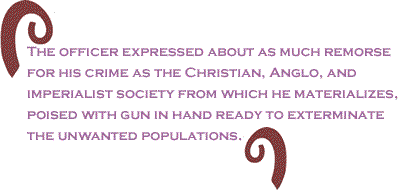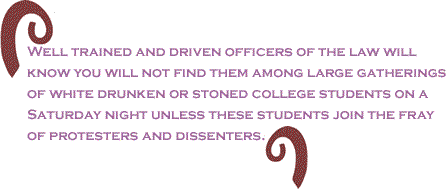He
did not murder Oscar Grant, but the young Black man lying
face down on the BART station platform is dead.
�My
son was murdered,� Grant�s mother Wanda Johnson proclaimed.�
�The law has not held the officer accountable.��
The
U.S. does not consider itself under the spell of fascism.
The history books tell us that the U.S. and its allies
crushed fascism in 1945. The Christian nation, Anglo with
�minorities� is a global influence for good contrary to
Chalmers Johnson�s
characterization of the U.S. as a �successful� imperialist
state and as such requires its domestic republic or
domestic democracy to �change into a domestic tyranny�
(Nemesis:
The Last Days of the American Republic (American Empire
Project). In the history books, the U.S. is a succeeding
experiment in democracy.�
The
U.S., the rhetoric will tell us, has come a long way.�
The president and the attorney general are members of
the African American community, proof that Grant protestors
calling for �accountability,� �rioters,� the Chalmers
Johnsons for that matter, are disgruntled, angry, dissident,
naysayers�war criminals.���
It
is no accident that while the jury deliberated the fate
of the BART police officer, the State�s corporate media
apparatus disseminated information on how the State, harnessing
law enforcement personnel, high-tech weaponry, and armor,
would protect property against an angry population hell
bent on violence.�

In
the meantime, the officer expressed about as much remorse
for his crime as the Christian, Anglo, and imperialist
society from which he materializes, poised with gun in
hand ready to exterminate the unwanted populations.�
The
madness has its logic or why else would it be repeated
again and again.� In one night, the U.S. and its allies
incinerated 100,000 people in the city of Tokyo.� Former
strategist for the Air Force under Gen. Curtis Le May,
former Secretary of Defense under John F. Kennedy, former
World Bank president, a revisionist historian, Robert
S. McNamara revealed to documentary filmmaker Errol Morris
and the world in Morris� Fog of War that Le May,
during WWII, worried that the generals and troops, the
U.S. government and its allies would be charged with war
crimes if victory escapes them. The U.S. must win this
war! Fat Man dropped in Nagasaki and Little Boy dropped
in Hiroshima consumed homes, buildings, and, above all,
war criminals.
Lyndon
Johnson�s war on �tyranny and aggression� normalized the
use of napalm over Vietnam. Richard M. Nixon and Ronald
Reagan use of the CIA machinery to overthrow democratically-elected
foreign heads of state, established the right of the U.S.
to install military dictators to further enrich the coffers
of the World Bank and the IMF. Bush I and II and the current
administration have renamed the pogrom to eliminate tyranny,
aggression, and war criminals from the world. Even
now, as I write this essay, the Orwellian report for today
announced that Marine Gen. James Mattis has been nominated
by the current administration to head the U.S. Central
Command.� The man who bragged that he loves to �shoot
some people� will in all likelyhood charm the folks on
Capitol Hill because he has all the right qualifications
to pursue war criminals and achieve victory for
the U.S.
It
is all a �hoot,� just as Gen. Mattis notes. All very logical.�
Looking
for remorse, you will not find it here!
Read
the policies and laws carefully. While Gen. Mattis scourers the globe in search of
war criminals, here at home, prosecutors and any law enforcement
agency will tell you that it is not hard to spot this
subhuman and powerfully evil force of war criminals. Well
trained and driven officers of the law will know you will
not find them among large gatherings of white drunken
or stoned college students on a Saturday night unless
these students join the fray of protesters and
dissenters. They will not be found working on Wall
Street unless some �disgruntled� employee becomes a whistleblower.
Civic and race leaders, as any good police state
knows, will accept payments, guarantees of safety for
family members and close associates, and even token positions
as spokespersons for the war criminals. Looking
for remorse, you will not find it here! As accomplices,
they further divert the people�s attention from loads
of chained citizens boarding buses baring the insignia
of the U.S. Sheriff�s Department. Elsewhere, trucks with
the insignia U.S. Army or insignia U.S. Border Patrol
or ICE or Homeland Security deport aliens or terrorists�war
criminals all�to Gitmo or to Bagram or to another friendly
nation where the state police are in control�
Oh,
it has all been studied and analyzed while the American
public went to sleep�

�It
was a matter of fliers,� Jean Amery writes.� The �leather
coats� spotted the Belgian resistance fighter passing
out fliers that read: �Death to the SS bandits and Gestapo
hangman.� It is 1943.
At
his first interrogation, he notices how the �leather coats�
had faces, �not �Gestapo faces� with twisted noses, hypertrophied
chins, pockmarks, and knife scars�but faces like anyone
else�s.� Plain, ordinary faces.�� In difference to Hannah
Arendt, Amery argues that �when an event places the most
extreme demands on us, one ought not speak of banality.�
This event, this encounter with reality, he writes, need
not be an encounter with torture per se. �Arrest is enough
and, if need be, the first blow one receives.�
At
first, you may think it, this event, some kind of nightmare
from which you will awake, you have to awake, Amery explains
in At the Mind�s Limits: Contemplations by a Survivor
on Auschwitz and Its Realities, because this other
seems to have made a mistake in selecting you to violate.�
 With
the first blow, the prisoner recognizes he or she is �helpless�
and begins to sense rescue is not forthcoming. It is not
the loss of something called �human dignity� that brings
about this sense of helplessness but the loss of trust,
Amery explains. With the first blow, the prisoner losses
�trust� in the world. The interrogators have rigged the
game: a resistance fighter outside the event is
now isolated in his or her misery and focused on the survival
of his or her own body.��
With
the first blow, the prisoner recognizes he or she is �helpless�
and begins to sense rescue is not forthcoming. It is not
the loss of something called �human dignity� that brings
about this sense of helplessness but the loss of trust,
Amery explains. With the first blow, the prisoner losses
�trust� in the world. The interrogators have rigged the
game: a resistance fighter outside the event is
now isolated in his or her misery and focused on the survival
of his or her own body.��
This
reality is relentless.
Torture,
writes Amery, is the essence of Nazism.� Through its practice
of torture, �the Third Reich materialized in all the density
of its being.� Communism, he argues, whether you agree
with it or not, nonetheless symbolizes �an idea� of humankind.
On the other hand, �Hitler Fascism was not an idea at
all, but depravity.� Hitler�s National Socialism �not
only practiced the rule
of the antiman but had expressly established it as
a principle��to exterminate and to enslave. Thus, the
Nazis �tortured with the good conscience of depravity,�
Amery writes.� Placing torture in their service, they
become its servants.

What
is the nature of this depravity? Put aside the sadism,
the �usual psychology handbook� definition, Amery suggests,
and consider sadism, as George Bataille defines it�a �radical
negation of the other� and �the denial of the social principle
as well as the reality principle.� In a sane world, he
explains, torture, destruction, and death cannot triumph,
but the �sadist does not care about the contrived existence
of the world.� Instead, �he wants to nullify this world,
and by negating his fellow man, who also in an entirely
specific sense is �hell� for him, he wants to realize
his own total �sovereignty.� Amery continues: �Torture
becomes the total inversion of the social world, in which
we can live only if we grant our fellow man life, ease
his suffering, bridle the desire of our ego to expand.�
But in the world of torture man exists only by ruining
the other person who stands before him. Bureaucrats! �Bureaucrats
of torture,� these antiman, who, with all their heart
and soul �went about their business, and the name of it
was power, dominion over spirit and flesh, orgy of unchecked
self-expansion.�
You
can be lulled back to sleep, slip into something akin
to �wretched admiration,� Amery writes, for this sovereignty
of power.
But
it is a power not to be trusted, he warns. The �sacral
sovereignty� of a king or a chieftain, while stirring
fear is, at the same time, the object of the people�s
trust. The power granted the bureaucrats of torture permit
them to plunge the prisoner from the world �into agony
and death.� For the logic of this madness is death�of
even the antiman, the torturer!
The
prisoner who survives his or her event is no longer
at home with the world, Amery writes. �That one�s fellow
man was experienced as the antiman remains in the tortured
person as accumulated horror.� This encounter with the
event blocks a view of the hope principle.� In place of
hope, fear reigns. Resentment reigns.�
But
resentment, as Amery concludes, results in the prisoner/survivor
serving as an accomplice to torture. �I do not
want to become the accomplice of my torturers,� writes
Amery.�
It
is said that we are �warped��[but this] sets me the task
of defining anew our warped state, namely a form of human
condition that morally as well as historically is of a
higher order than that of healthy straightness.�
Amery
argues that he must �delimit� resentment from Nietzsche
�who morally condemned resentment� and from that of �modern
psychology, which is able to picture it only as a disturbing
conflict.�

Resentment
further dislodges the prisoner/survivor from the world
where the discourse advocates abandoning the prisoner/survivor
so to abort the atrocity of the crime.� No, Amery writes,
for already, he argues, the child speaks of what is �already
past.�� Done! Over! Memorials commemorate:
To
end this cycle of madness with a revelation of its truth,
the torturers must �negate� themselves and in the negation
coordinate with me��with the prisoner/survivor.�
Discussions
on the �collective guilt� of the torturers and their enablers,
Amery writes, are useless. For, he argues, there can be
no such thing as collective guilt for the torturers�the
prisoners/survivors carry collective guilt. �The world,�
Amery explains, �which forgives and forgets, has sentenced
me, not those who murdered or who allowed the murder to
occur.� The prisoners/survivors seek �the eradication
of the ignominy.� And here, the author admits to a �daydream�
in which the German people spiritually reduce to pulp
not only the books, �but everything that was carried out
in those twelve years [1933-1945].� That, he believes
�would be the negation of the negation: a highly positive,
a redeeming act.� Only then, Amery writes, would the resentment
of the prisoners/survivors �be subjectively pacified and
have become objectively unnecessary.�

But
the books and methods of torture survived, we now, since
Amery�s death in 1978 know this. And we know this: we,
�the victims� today �appear as the truly incorrigible,
irreconcilable ones, as the antihistorical reactionaries
in the exact sense of the word, and in the end�seem like
a technical mishap that some of us still survived.��
In
the year 2010, the Orwellian voice declares on behalf
of the State that the Battle goes on! The Struggle strengthens!�
Do
not expect remorse: It is an anti-human ideology of death,
a mind set that we must confront before it reaches its
end.� For this time, it is far more pervasive and legitimized
until it does not even need a movement!
But
we do!
BlackCommentator.com Editorial Board member, Lenore Jean Daniels, PhD, has been
a writer for over thirty years of commentary, resistance
criticism and cultural theory, and short stories with
a Marxist sensibility to the impact of culturalnarrative violence and its antithesis, resistance narratives.
With entrenched dedication to justice and equality, she
has served as a coordinator of student and community resistance
projects that encourage the Black Feminist idea of an
equalitarian community and facilitator of student-teacher
communities behind the walls of academia for the last
twenty years. Dr. Daniels holds a PhD in Modern American
Literatures, with a specialty in Cultural Theory (race,
gender, class narratives) from Loyola University, Chicago. Click here to contact Dr. Daniels.

